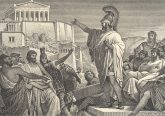 Sudhir Hazareesingh talks to Gavin Jacobson about his recent book, In the Shadow of the General: Modern France and the Myth of de Gaulle (New York, Oxford University Press, 2012).
Sudhir Hazareesingh talks to Gavin Jacobson about his recent book, In the Shadow of the General: Modern France and the Myth of de Gaulle (New York, Oxford University Press, 2012).
Gavin Jacobson (GJ): Perhaps you could begin by telling us about what led you to start thinking more closely about Charles de Gaulle, and why you decided to write this book.
Sudhir Hazareesingh (SH): When I was finishing my book on the Napoleonic legend, I concluded that since the 1980s, General de Gaulle had become France’s favourite national hero. I found this intriguing, especially as de Gaulle seemed to have been adopted by the Left, who had opposed him vigorously for much of his time as president. So I thought it would be interesting to explore how and why this situation had come about – and also how this Gaullist cult compared with its Napoleonic predecessor. So this is what the book eventually became: a study of what de Gaulle has come to mean to the French, and what his iconic status tells us about French political culture.
GJ: Could you give us some idea of what you mean by ‘myth’? How is your understanding of it here different from the way people like George Sorel have previously defined it, for instance?
SH: I use ‘myth’ to denote an idealized representation of a phenomenon, either by a collectivity as a whole, or within a specific ideological framework – it can refer to a historical moment, like the French Revolution; certain moral and political values (‘we are a freedom-loving people’); exemplary social groups like the bourgeoisie or the proletariat; or leaders like Napoleon or de Gaulle. Sorel’s notion is more normative, and also more narrowly focused, in the sense that he is talking about how certain political ideals can help collective mobilizations to bring about revolutionary change. I think of myths as a much broader category, and they are not just about transformation: a powerful myth can also prevent substantial change (see the monarchy in Britain today!). I think myth is a useful concept for the social scientist because it opens up new avenues for analysis. Politics is too often thought about purely in ‘rational’ terms, as a function of interests – the concept of ‘myth’ is helpful to understand what role memory, imagination, and passion can also play in politics.
GJ: How much was de Gaulle involved in actively cultivating his own myth, and what sort of tactics did he employ in order to go about this?
SH: De Gaulle was a remarkable creator of myths, right from the moment of his Appeal of 18 June in 1940 – very few people heard his broadcast on the BBC, but by 1944 de Gaulle was claiming that his appeal had been overwhelmingly endorsed by the French people. He invented a new political tradition, but also presented himself as the inheritor and continuator of earlier forms of French patriotism (symbolized by figures such as Joan of Arc, Gambetta, and Clemenceau). And he constantly represented himself as a saviour, a providential figure, and a prophet – this was the main message in his War Memoirs, which he wrote in the 1950s, and which prepared the political ground for his return to power in 1958. In this sense (and to go back to your previous question), one could say de Gaulle’s conception of his myth was somewhat Sorelian: he used it to change collective understandings of history, and to revolutionize the French political system.
GJ: You are renowned for your rich and forensic use of archival materials. Your previous scholarship on the legend of Napoleon, or on French Republicans of the nineteenth century, is built upon on a vast amount of primary research conducted at the central, regional, and local levels. What kind of sources did you draw upon this time around to get a sense of the nature, pervasiveness, and also limits of the Gaullian myth?
SH: I was fortunate to find some wonderful archival material in national and local archives. At the Archives Nationales in Paris I worked on the correspondence received by de Gaulle during his presidential years – an average of 100,000 letters a year, which provide fascinating insights into the way ordinary French men and women viewed him. Likewise, in the Departmental Archives of the Haute-Marne I found a lot of interesting material on de Gaulle’s home in the village of Colombey – especially after his death, when the site became a holy shrine, with hundreds of thousands of visitors each year. The most remarkable collection of documents were the registers of condolence held at the Fondation Charles de Gaulle: when the General died in 1970, these registers were opened in municipalities across France, and people came and inscribed their thoughts about de Gaulle in them. The material is very rich in what it reveals about popular representations of the General, and it is clear that his myth was already flourishing at the time of his death.
GJ: Let us consider de Gaulle the man for a moment. When we turn to Anglo-Saxon accounts of de Gaulle there seems to be a common weakness when it comes to dealing with his republicanism. Some ignore it, while others (such as Jonathan Fenby in his recent biography) misinterpret it entirely, seeing ‘Gaullism’ as a standard of behaviour rather than a political doctrine. Could you tell us a little bit about what the central features of de Gaulle’s republicanism were?
SH: The generic Anglo-Saxon view of de Gaulle as an irritating and self-obsessed Frenchman is a caricature (even though de Gaulle could be both of these things!). I see De Gaulle basically as a modern Jacobin: he is patriotic, believes in equality and centralization, and that politics should serve the general interest, and of course he has a powerful sense of the universality of French values. It is no coincidence that Lazare Carnot, the member of the Committee of Public Safety who was the architect of the French victory in the Revolutionary wars, was one of de Gaulle’s heroes. That said, de Gaulle’s republicanism is distinct from the dominant 19th and early 20th century models – he rejects the parliamentary system in favour of a more presidential regime, in which the executive also regularly consults the people through referenda. Gaullism is in this sense something of a synthesis of republicanism with Bonapartism.
GJ: Staying with republicanism, what do you think the almost universal veneration of de Gaulle in France tells us about the seeming tension within the republican tradition between the commitment to popular sovereignty on the one hand, and the ‘cult of great’ men and the celebration of heroic leadership on the other? Do you see this as something specific to French republicanism?
SH: Absolutely, this tension runs through the republican tradition from the very outset, even before the Revolution: Rousseau believes that under certain circumstances, power should be concentrated in the hands of the Lawgiver. But this proved a controversial proposition, especially in light of the King’s treachery during the Revolution. So strong leadership becomes a source of suspicion in the republican camp: when Robespierre is eliminated, he is accused of wanting to restore the monarchy. Napoleon’s overthrow of the Republic in 1799, and Louis Napoleon’s coup in 1851, did not help matters either; but this tension between strong leadership and popular sovereignty is a historical contingency, and not a necessary component of republican doctrine.
GJ: De Gaulle has not only been a figure of celebration for the French. His myth has also taken on international proportions. Could you comment on this and give us some idea as to what is it about de Gaulle that has led him to be championed by different types of political leaders across the world?
SH: There is, as with all great political myths, a wonderful plasticity about de Gaulle’s cult – and this is replicated on the international scene. He is the archetype of the conservative providential hero (for example Richard Nixon was a great gaullophile); authoritarian democrats like Putin and Erdogan are sometimes compared to de Gaulle. Fidel Castro, in contrast, admired the General as a national liberator, in the Bolivarian tradition (and also for standing up to the Americans), while the Palestinian leader Yasser Arafat celebrated him as the defender of his people against military occupation. Eurosceptics to-day cite him approvingly for his rejection of the idea of supranationality – earlier this year I read a piece by Charles Moore in the Telegraph saying that de Gaulle had been right to veto British entry into the European Economic Community. This perfectly captures the breadth of de Gaulle’s appeal: from Tory Euroscepticism to Castrism!
GJ: De Gaulle had a famous phrase: “Everyone has been, is, or will be a Gaullist”. Do you think history has so far proved him right?
SH: In his gloomier moments, he sometimes also thought the French would fall apart when he was no longer there. Shortly before his death, he pointed to the hill just outside Colombey where the monument to his glory was to be built, and said: ‘no one will come here, and so no-one will see it, it will inspire rabbits to join the Resistance’. But he has not done too badly – he has become the most famous Frenchman of modern times. In the 20th century, the only other figure that comes close to him in this respect is Jean-Paul Sartre, and his stock has fallen considerably since. In France today, de Gaulle is celebrated as the incarnation of the French Resistance, and the admired founder of the Fifth Republic, setting an impossible standard for all his successors. But it’s not so much in his politics that he triumphs to-day (the world is very different now after all), but in what he is deemed to exemplify: a dislike of partisanship, a sense of integrity, a commitment to the public good, a contempt for materialism, and a belief that political action can achieve meaningful change.
Dr Sudhir Hazareesingh is a CUF University Lecturer in Politics and Tutorial Fellow in Politics, Balliol College, Oxford.
His book is available in all good bookshops, including Blackwell’s.







1 Comment